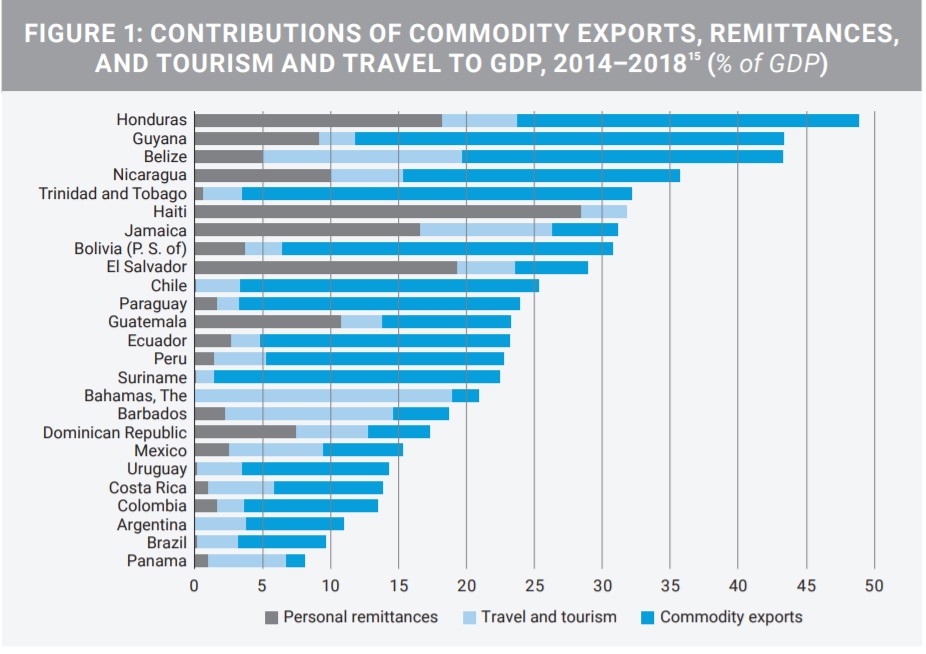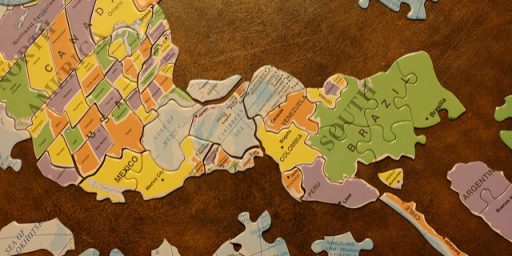Latin America and Covid-19
The pandemic is having serious effects in the region, and they will persist for some time.

Via CBS News: Latin America: The global epicenter of COVID-19
The number of COVID-19 cases in Latin America and the Caribbean has positioned the region as the global epicenter of the virus. Health professionals and regional experts are warning that if nothing is done, the region will see major setbacks, including a massive rise in poverty and a rise in authoritarianism, as leaders see an opportunity to crackdown on dissent. Latin America, which accounts for 8% of the world population, has reported nearly 30% of the global fatalities.
[…]
Reported deaths in the region have topped 230,000, according to data from Johns Hopkins University, putting the death toll for the region as a whole higher than that of the United States and Canada combined. If prevention measures are not maintained, the death toll could reach 438,000 by October, according to the World Health Organization’s regional director for the Americas.
If we look at the Worldometers stats and sort by cases per 1 million, French Guiana is #2, Chile #5, Panama #6, Peru, #8, Brazil #10, Aruba #14, Colombia #20, Turks and Caicos #22, and Bolivia #24 (half of the top ten, and nine out of the top 25).
In raw numbers, Brazil is #2 in the world in cases behind the USA as well as #2 in deaths, again behind the USA (which ought to be tired of all the wining, I have to add), with Mexico in third place.
In terms of death per million residents, Peru is third on the list and Chile ninth. With Brazil (11), Mexico (12), Panama (14), Sint Maarten (15), Bolivia (16), Ecuador (19), Colombia (20) occupying space in the top 25. (The US is 10th by this metric).
A key implication of this situation is that the region is economically vulnerable and therefore the impact of the disease on the region would be devastating. I am seeing talk of a second “lost decade” for the region (i.e., that all of the economic gains of the last ten years could be erased). This would be a “second” lost decade to go along with the 1980s, known as the Lost Decade due to the effects of the debt crisis on the region.
The pandemic has highlighted the existing weaknesses in the region, such as persistent inequality and poverty, at a time where the region was already struggling. Additional factors, such as the reliance on tourism, commodity exports, and remittances (money sent from citizens working abroad mostly in the US) are especially problematic under current conditions.
As a recent UN policy brief (The Impact of COVID-19 on Latin America and the Caribbean) notes:
When the pandemic hit the region, its economies were already experiencing serious difficulties. In the preceding six years (2014-2019), economic growth had been the lowest (0.4%) recorded in since 1951. In addition, fiscal space contracted and public debt increased in Latin America, from about 30% of GDP in the period 2009-2011 to over 45% in 2019. In the Caribbean, the average debt was 68.5% of GDP in 2019. As a result of a series of external shocks, compounded by structural weaknesses and vulnerabilities and high exposure to natural disasters and the impacts of climate change, some Caribbean SIDS are among the most indebted economies in the world.
Therefore,
ECLAC estimates that GDP could fall in Latin America and the Caribbean by 9.1% in 2020. The external drivers of this are an expected fall in exports (20%12), a decline in remittances to the region (of around 20%13) and lower demand in the tourism sector (during the first four months of the year tourist arrivals fell by 35% in Central and South America, and 39% in the Caribbean14) (see figure 1), which will hit the Caribbean particularly hard . Women will be especially affected, as they are more likely than men to work in accommodation and food services (60% of employees), a proxy measure of employment in the tourism sector.
Note this graph:

All of this is quite significant. Consider, for example, the importance of remittances and think about how much of that is from workers in the US service industry and how the pandemic has affected the said industry. I am especially struck by the hit that the tourist industry is taking, and is going to be taking, as we continue to deal with Covid-19.
Reliance on commodity exports (e.g., raw materials, agricultural products, etc.) is a long-term story in Latin American economic development. One thing is certain: when there are global tough times, commodity prices suffer. And, certainly, the US is a major customer for those goods, and as the US economy suffers, so, too, will these economies suffer.
Note, especially, Honduras. It is one of the countries that has been a source of migrants to the US and the crisis that the Trump administration has helped create on the border. If almost 50% of that country’s GDP is made up of tourism, remittances, and the commodity trade, what do we all think is going to happen to the flow migrants from Honduras? What affect will this have on violent gangs linked to the drug trade? How will this spill over into neighboring states, who are also dealing with similar issues?
The management of this crisis in the US (or, indeed, lack thereof), as well as the poor management in larger Latin American states like Brazil and Mexico, has broader impacts. Mismanagement in the US affects Honduras directly, which will have economic impacts on that country for the next decade and will, therefore, have policy implications for the US for years and years to come (both in immigration and illicit drugs).
All of this underscores, yet again, how the ineptitude of the Trump administration has large, long-term, global implications. While no one could have stopped the pandemic, having a competent POTUS who took this seriously back in January and February (and who worked effectively with leaders in other countries) could have led to a far more efficacious response.
Instead, here we are.
And beyond the economic effects, the pandemic is creating space for democratic backsliding in the region. Back to the linked CBS article:
“The pandemic arrived in Latin America at a time when the region was already suffering a democratic disaster,” said Daniel Zovatto, a senior fellow at the Brookings Institution’s Foreign Policy and Latin America Initiative, referring to the wave of anti-government protests that took over the region last year, in countries including Chile, Venezuela, Honduras, and Haiti.
[…]
In some cases, like that of El Salvador, Zovatto said that President Nayib Bukele used the pandemic to consolidate executive power from the congress and supreme courts since he did not have a majority. But there are more serious examples, like Cuba, Venezuela, and Nicaragua – countries that already have authoritarian regimes – which have used coronavirus restrictions to crackdown on dissent and protests.
“We have to coordinate, and speak out as one voice to defend our interests,” said Zovatto, of all the countries in Latin America, “to let the world know that Latin America also needs help. If we don’t find that help, we’re going to find ourselves in a very difficult situation.”
So, when people pretend like this is all no big deal, or that we are all just overreacting, the fact of the reality of it all is actually more than a bit depressing.
Es lo que es, I guess.






I’m curious, @Steven, if you have an explanation for why Americans don’t care about South America. It’s never in the news except in reference to immigration. Americans (norte americanos) don’t visit much, evidenced by the lack of air service relative to Europe. A guilty conscience? A tendency to see anyone from south of the Rio Grande as a Mexican? It’s odd, given that north-south travel is easier on the system than flying across eight time zones.
With globalism faltering and climate change arriving on scene we’re going to have one hell of an illegal immigration problem. Nothing compared to what Europe is likely to face, but serious, nonetheless. There will be boat people – if you can cross the Med you can cross the Caribbean. The smart move would be for the US to focus resources on shoring up CA and SA economies, but we don’t generally do the smart thing.
At least not until every other alternative has been exhausted anyway.
@Michael Reynolds:
I’m torn. Last time we tried to shore up the region we supported right wing death squads, but a strong, vibrant Mexican economy means people fleeing poverty further south will stop there.
I guess I just look at our record and don’t trust us to not fuck it up.
You put a lot of effort into writing what we all know (Latin America is pretty screwed) in greater detail than most of us know. I have nothing to add, I just wanted to acknowledge the effort.
They’re pretty screwed and poor US leadership doesn’t help them (or us).
@Michael Reynolds:
I’ve notice, while travelling in South America, that relatively few Americans (or Canadians) go there — you’ll meet a lot more European travelers in SA than North Americans. It’s not primarily the distance, crossing the Pacific to Asia is a much longer trip, but seems much more popular. Maybe its just what you refer to — people in NA don’t think about SA much.
BTW pre-Covid-19 SA was an excellent place to travel; friendly people, good prices, and a wide range of extremely beautiful and interesting places (everything from the Andes to the Amazon to great beaches). With Covid-19, probably not advised though.
Though as Gustopher pointed out, NA interest in how SA is governed (or its economy) has a bad history.
@Gustopher:
Have we ever tried shoring up those economies or have always looked to protect the ruling elites and the US companies that exploit the region?
@Gustopher:
I don’t, either. But the alternatives could be nightmarish. People who can’t feed their children migrate to where they can be fed. This wouldn’t be migration to ‘get a job’ it would be migration to not starve. That could involve hundreds of thousands of people. The Mexican government won’t be politically able to stop them, and no wall will stand against those kinds of numbers. If we don’t want to be machine-gunning families in the Sonoran desert we have to at least try.
Central America (excluding Panama) has about 40 million people, with a PPP GDP that tops out around $8,000 – very unevenly distributed. We could make direct payments to CA citizens of, say, $100 a month, ($400 to a family of four) at a cost of about 4 billion a month, 50 billion a year, a little over 1.25% of the federal budget, and put the entire population well outside the starvation zone. Cut off funds to anyone caught crossing the border. Basically pay them enough in a UBI to make staying at home a more viable option.
@Michael Reynolds: Open question to people who might know (I know that I don’t): in thinking of travel to LA vis a vis Europe, should we consider travel to Spain and Portugal as a separate category? I’m just guessing, but I’d guess that the ratios are probably similar for LA and for S and P. If so, I’d surmise that the reason for the
gapdisconnect from LA fortunes and future is because Latin Americans aren’t part of the *us* that Canada, and even Mexico (cast in the role of red-headed stepchild, if you will) are. Just musing aloud.@Michael Reynolds: Por supuesto los Mejicanos están norte americanos, no sur americanos. Pero, tu lo sabes.
I had the great and lucky pleasure of traveling to Peru and Ecuador at the end of February. My guide in Peru talked about how many fewer Chinese were traveling there, presumably because of COVID, but he thought there were more North Americans than usual, presumably substituting SA for China. I worry for my guide and his family in Cuzco, but I think it’s Lima that’s really getting hammered (and had the terrible night club incident this weekend). Once we get past this pandemic, I recommend SA to anyone. It really is easier to travel to because of time zones and it is all worth seeing. While I need to up my Spanish game, I had plenty of people willing to explain it again to me, slowly.
@Michael Reynolds: Instead of a half-assed comment reply, I have provided a still pretty brief (relative to the question) full post response.
@Joe:
Indeed.
Pre-Covid, my wife and I traveled to Ecuador, as a possible place to purchase a retirement home; in Manta, specifically. We found it amazing. It’s easy to establish residency as an American, and health insurance runs less than $100/mo for a couple. We looked at several ocean front 2/2 condos, each with a multiple large balconies facing the ocean, for less than $200K. Or you could rent a place for less than $800US per month. We’re thinking of spending six months there, renting to see how we like it – once Covid passes and if we’re still alive.
I’ve spent time in Argentina, Bolivia, Chile, and Brazil. I would not go back to any of them now, except maybe Bolivia, and definitely not Brazil or Argentina. It’s bad, and getting worse, mostly due to income inequality. You can’t keep up a system where most people are poor, and the wealth is all at the top among a few families. It’s not sustainable.
@Michael Reynolds: Look at how we treat people who get welfare here. Now you want to create a continent of them? It might be the logical thing to do (I can think of other alternatives), but we live in a democracy that hates poor brown people.
Not being considered at all might be the best they can hope for given our track record of interventions and attempts to help.
Now, if the US government bought grain and corn for Latin America, and used this to prop up our agricultural industries, and structures it in a way to help small cities and towns in middle of the US… well, there would still be people who want to lace the food with contraceptives, but it would be an easier sell.
However, I expect we will just nuke some refugees at some point in Central America. Create an irradiated zone the protects North America and then make Mexico a vassal state after a coup. The only question in my mind is whether it will be President Crenshaw, Jordan, Cotton, Gaetz or Gohmert. Maybe 2031. We’ve seen a wave of nationalist proto-fascists in Europe and the US with a modest refugee crisis, I don’t think a larger refugee crisis is going to end well.
Gohmert is probably too old. Don Jr?